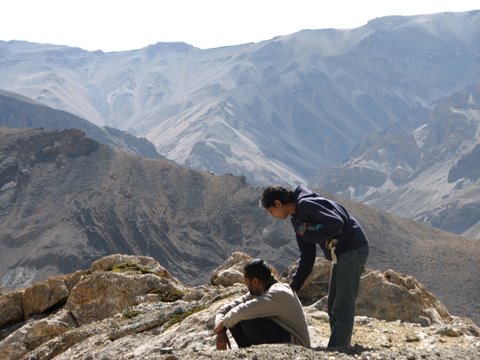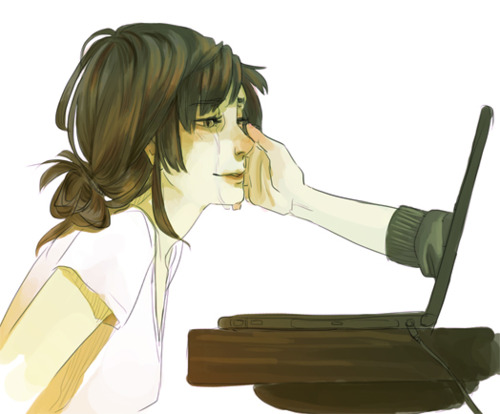A Friend In Deed

"Friendship is about mutual respect, affection, help, and providing comfort in times of crises. Friendship is a mutually supportive relationship between two or more people." (1)
This is a simple and succinct statement, is it not? It covers the essentials of friendship and what it means to be friends. At one time pretty much everyone understood and accepted this definition. Friendships are not to be taken casually, though one can have casual friends, and it is not to be seen as merely a label for it is more like a title bestowed upon another because of the nature of their relationship. Further, friendship must be reciprocated and shared for we cannot have a true friendship without that essential ingredient. A friend is almost an extension of self rather than a relationship between two mutually exclusive people.
Friendship is something to be valued, cultivated and honoured, it is not a casual thing though today it does appear that what it means to be friends is undervalued and misunderstood. Why? There are a number of contributors to this change among them are the gradual disintegration of the "nuclear family", closely knit neighbourhoods and communities, the growth of urban centres, the advent of communications technologies (ex. cell phones and the internet) and even on-line social software. However, these are contributor's to it and not actual source of the shift. The real shift has occurred with us, humankind, as a collective group.
These influences have changed us so much as they are a reflection of our own changes. In the essay "What Is Going On" I stated:
"There has been a great deal of change over the course of my lifetime, on many levels, and this is showing no signs of abating. All one has to do is compare the toys and capabilities we have now compared to just 40 years ago. In that time, roughly since the mid to late 60’s, we have seen the gradual development of a new view of reality and the birth of new possibilities. It is no accident that, along with this, there has been a tremendous shift in technology that has expanded our capabilities at an accelerated rate. In the essay “Our Modern Times” (1), I wrote about the massive changes that have occurred over just the last century and that these changes have not only significantly affected our collective consciousness, they have added new stresses.
Certainly, this ‘new age’ is one of almost limitless possibilities, especially when compared to a century ago. It is one that has been fueled by the new found freedom to imagine and manifest. What has fed the flames is not the technology we have invented; that is a by-product of our conscious evolution. They have been fed by new thought forms: new concepts of reality and the subsequent shifts in beliefs." (2)
The shift within us has led to a new age of what at times seems like one of limitless possibilities. Indeed I believe this is true, certainly now more than ever. Yet there have been consequences to this shift and you see this clearly in the loss, or certainly lessening of real connectivity between people. You often see a group of teenagers walking down the side walk together and each of them are talking on or playing with their cell phones rather than talking to each other. Relationships are shorter and have less depth, they are ended via text messages or status updates and even terms like Best Friends Forever are easy to say but not often followed through on and so on.
When I was in grade and high school there were only a few cliques and most fit into one or more. Support groups from kids with issues are who were different were few and far between. In such cases you either talked to your parents, friends (if you had any) or you kept your issues to yourself. You might have gone to a library to see if you could find any information on whatever the concern was, but beyond that there was nothing. If one had a strong friendship that included honesty they could speak with their friend about it and get seek support, consolation or perhaps a solution from them. Today there is a group for everything and one can invariably find someone else somewhere who holds the same beliefs, ideas or notions or who frequent the same stores or even own the same items no matter how obscure the brand or item may be. As comforting or as helpful as they may appear this is not a substitute for a real life true friend.
There is a reason why people say if you have one true friend consider yourself lucky. Such friendships do not come about because of a whim, they are based on trust that has been earned and are mutually acknowledged. There are many ways to earn that trust; however, the point remains the same. It is not a casual title given to someone because you happen to know them. Those we know casually are acquaintances not friends.

The trust that is needed for friendship is something that can happen quickly though generally it takes time to develop. Trust isn't the only element needed, among other things friendship requires mutual affection, that is friends care about one another. The combination of these two elements also creates an energy relationship between friends. We do this regardless of whether the person is someone we have physical contact with or not for we are capable of developing friendships with people who we have never met in person. The key is we are connecting to an actual person, but that was before the internet and virtual relationships.
The internet has had a huge influence on us and our culture. It has enabled the sharing of information on an enormous and unprecedented scale. One can read newspapers, watch videos, listen to music and podcasts and so on from all around the world. This has lengthened our reach and allowed us to to connect and interact with people from all around the globe in ways we could barely imagine doing before. It has given every voice a platform, regardless of how many are tuning in. It also creates the illusion of connectivity, though real connectivity is also possible, as the cyber world is rife with people who pretend to be something they are not.
There is a reason why parents are smart to be mindful of their children's use of the internet. I would venture to say many adults should be more mindful of their own activities. Normally, one would get to know someone first, intuitive awareness aside, before even beginning to consider them a friend. This goes back to that element called trust, something that is challenging to establish on the internet. By extension you would think that people would be more cautious or circumspect on whom they befriended when using the internet though this is all too often not the case.
In our personal life caution is just as important though much easier to do. We can observe people, verify information about them (without being nosey or spying on them) and we are much better at getting at least some idea about people including from the "vibe" they give off. Not that we should necessarily trust such thoughts about others for any energy that comes to our attention from beyond our energy field will be modified by the energy in our aura (auric field) as well as by our thoughts (preconceptions and stereotyping etc.) and our emotions.
Our connection to others is much more tenuous on the internet. One must have a fairly well developed sensitivity to energy in order to read the energy one gets from say a status update or even an email. It certainly is possible to do so, though one should be very cautious of impressions they get from such things whether "good ones" or not.
Part of the challenge on the internet is many do not seem to get how exposed they are when they use the medium or if they do they certainly do not act like it. Yes, there are lots of wonderful, loving and caring people, just as there are many who are not so wonderful and who do not have their best interests in mind. The latter point being especially important, hence one should never assume others have your best interests in mind or that they are concerned about your well being in any way. To do so is foolhardy. One should have a realistic view of the risks involved when connecting with strangers on the internet (just as in real life). Those that do not pay attention to this may find themselves having to deal with an issue as a result, perhaps a serious one, but that is what may take to jolt people out of their false sense of security.
My words of caution are not meant to scare you, quite the opposite. The internet is a wonderful tool for researching, learning, exploring and yes, meeting new people. That said, one of the consequences of the gradual disintegration of our historical family, community, cultural and other units is that people feel disconnected. A great many drift on the edges of various groups and never become connected in a meaningful way. It is a gap they seek to fill, whether they are conscious of it or not. Such people would do well to remember the saying that is on the side view mirror of cars many, "objects in the mirror are much closer than they appear" for the opposite is often the case in many internet relationships.
Nonetheless, if we are honest, trusting and caring with people we meet on the internet, and they reciprocate, we can find good friends there too. We can do this through emails, Facebook, MySpace, YouTube, MSM or any other socially oriented websites. However, such sites can create problems in that they do not differentiate between degrees of friendship. For instance, there is no option to mark someone as an acquaintance, someone we know better than that and those we have actually become friends with (in the true sense of the word). All degrees of closeness are lumped into one category -friends - so all people are more or less treated as equal even though trust and interest levels between them vary. Yes, we can often change some settings with regard to them, but not nearly enough to give us the flexibility to handle a variety of relationships.
Given all of these factors, how should one treat friendship today? I believe that we should treat it the same as we always have. We should only consider people to be friends if they meet the definition of the word, not because they are someone who is tagged a friend by a software application or even in person when we have interacted with them a few or even many times. It is the relationship that defines friendship, not the label. Still, the fact is that many treat this very important type of relationship casually, and by doing so diminish what the word friendship actually means.
We cannot change how others relate to the word or how they choose to view friendship. All we can do is act within the bounds of what the term means and honour that definition. A Facebook or any other type of social media friend is not a friend simply because that is the label that a social media site gives us to use. They are first and foremost just people whom we have connected with, the nature of that connection is what determines whether they are actually friends or not.
If we add people to our "friend list" indiscriminately or with unrealistic expectations then we are more likely to treat the relationship the same way and potentially set ourselves up for future issues. I do not add friends in Facebook or any other social software in this fashion, nor do I consider them friends in the true sense of the word even when I do. That is a title that is earned, not given away. At the same time, I accept friendship offers even from people I do not necessarily agree with on every topic in part because I am not bothered by different perspectives. So long as the person has a good heart, appears to care about and is respectful of others, not belligerent and through their posts show they have good character and so on I will accept their offer.
People can disagree on issues and it doesn't make either person bad or necessarily wrong. The world is not black and white, it is shades of grey and we can all learn from each others perspectives if we care more about other people and respect them rather than thinking we are always right and those who disagree with us are wrong. There is no right or wrong when it comes to dealing with "grey", there are merely choices and consequences.
We also have to be aware of what we are expecting when it comes to people we accept as friends through various websites. We should be aware, or at least try to be, of the whether we looking for validation, people who agree with us or who are like minded, support, variety and so on. This is not a trivial point as we should always have some idea of our intent and what is motivating us when we make choices. If we don't we are likely to be disappointed, frustrated or even get angry with some of the actions of our "friends".
Be that as it may, regardless of our intent we may very well accept friendship from or offers it to others who may at some point post something that "bothers us" in one way or another. We have a tendency to assume to much about others but just like us they have bad days, they can react emotionally without thinking or as mentioned hold beliefs or ideas that we may not agree with. This should be something we expect and be prepared for.
Having observed user's of Facebook, MySpace, YouTube and the like for years getting friends is the easy part. Accepting them as "friends" is a little harder, especially when they post things we do not agree with. I have had this happen on occasion, though I generally leave their posts on my timeline unless they are offensive or inflammatory for example. I have a number of young friends, under sixteen, and do not want to them to be exposed to certain influences through me. Rather than "un-friend" the person who posted the status update or comment I will hide it. At the same time I recognize that they have the freedom to choose to post what they like and do not concern myself with occasional occurrence of such things.
In the one case where it happened more than once I sent a private message to the individual asking that they not post such comments and explain why. So far no one has done so again. Should that happen I will deal with it in the same fashion and only if it were to occur again would I consider removing them from my friend list. I have never had to do this yet, perhaps because I am not very judgmental and am selective about who I offer friendship to or accept such offers from.
To me the term "Friend", in the context of social software, refers to someone who can post on my timeline and with whom I can interact. It doesn't make them a "real friend", though it also does not mean we cannot become such friends, it only means that I do not assume someone is a real friend simply because they are listed by the software as a friend.
This goes both ways as well, we should not make presumptions about what others think about us regardless of our interactions with them. The bottom line is we should not assume someone is a "true friend" just because we feel that way towards them and would like to assume they feel the same. Not even saying that makes it so, that is something that can only be tested with time or some form of direct contact. If you think about it, being members of the same family doesn't necessarily make two people friends, so why would we extend that term to someone on the internet?
The previous question is rhetorical for each individual will have their own reasons for doing this. This leads to another potential issues such as our expectations of others and the people we call friends may not have the same definition of the term and of course they will have their own expectations as well. Adding to the challenge is that many people are lonely, feel disenfranchised, seek validation or perhaps support. This makes them vulnerable to being taken advantage of as well as having their feelings hurt should others decide to terminate their "friendship".
We can share our secrets with people on the web, not that I recommend doing such things, unless one knows the person more than through the software or have a well developed sense of intuition. Sure, we can share and very likely have no problems, but they can still happen. In many ways we do need to consider people on the net strangers. Again, being in our "Friends" list does not make that the case at all and should always assume that they may not the type of person we think they are. Bear in mind that most people tend to display what they consider to be their good traits on the web and try to avoid revealing any "negative qualities" they may have. This is a natural tendency as people generally want to be liked and many see this to be the best way to do that.
One major factor in our online relationships is our level of self esteem. It affects not only how many friends we are likely to have, it also has a significant impact in our relations with them. If how many friends I have, being validated in one manner or another or what people think of me matters to me then we are potentially allowing ourselves to be hurt when someone withdraws friendship or makes negative or disparaging comments about us. We should remember that just because someone says something about us we don't like does not mean that there isn't truth in it. Hence, we should not simply discount someone's observations about us simply because we don't like what they say for their observation may be accurate regardless of whether they were saying them callously or not.
At the same time, we are not required to maintain a relationship with someone who's words or acts we find distasteful or hurtful (even if what is said is true). Whether we maintain such relationships is a matter of personal choice and we should respect others choices regarding us as well. This is where it can get messy for everyone has their own reasons for ending an on-line friendship, but when we do it we are in control. When someone else does it we can feel like we were hit with a hammer. Why we feel this way is often due to such things as we may really like them and enjoy having them as friends, and we have our expectations of the relationship. When it is someone we do not interact with much we likely do not even notice it; however, when it is someone we like, a real life friend or a family member it can be devastating.
There is nothing we can do about the choices others make, we have to live with them. They have the right to do as they choose even if it is done callously, in anger or for any other reason. The internet makes dumping "friends" easy to do; one click and they are out. This is irresponsible on their part, for it is the easy way out. In my estimation, when we have a friendship and their are problems we should try to communicate our issue(s) with the other person, give them a chance to speak to them in some fashion before it comes to the point where one "unfriends" someone (except perhaps in the case of very heavy abuse or threats and so on). That people typically do not do this is their weakness not ours and should only come to this if "talking" about it doesn't resolve the problem for whomever has the issue.
All we can do is act with honour and respect others regardless of whether we are choosing to end a friendship or whether someone is ending one with us. This means that when we feel the need to end a friendship, except in rare cases, we should have the courage to speak with the other party first. I realize this can be hard to do whether we are on the receiving end or not; however, for anyone on the path of personal and spiritual growth this is something we need to try to do for that person we friended is not some computer generated avatar, it is someone of flesh and bone with real feelings.
The issues we may have with the actions and choices of others or even in doing the honourable thing ourselves are our growth points. We can overlook them and choose to focus on the other persons reasons or justify our choice. At the same time, if we live our life as unconditionally as we can then we can understand how another might choose a different path and respect and even love them all the same. Yes it can be hard to do, but the other path leaves us stuck with our issues and the illusion our minds have created for us.
There is another challenge as well, just as can occur in our world outside of the net, even after we remove someone from our friends list we can still be connected to them through the friends you share. There are no easy solutions to this and it becomes, in a manner, a test of our level of love, compassion and sympathy for others and of our character.
What I have been speaking to above does not apply so much in the case of those who add friends or request friend status casually as such people are not generally looking for friendship from others. Having said that, one should be mindful not be callous or uncaring of how others may feel if "unfriended" as they may have a different view of the friendship.
Friendship is not a word one should use casually, it devalues the caring and love between two people that the word represents. Friends see features in each other rather than flaws and are inclined to be less judgmental of each others failings and issues rather than pick on you for them (unless they know that you can "handle it"). They know that no one is without such challenges and see through and beyond them. Cyberspace does not make that easy because people do hide behind the wall of anonymity and can portray themselves as something that they not.
We should not treat those we meet on the internet any differently than we do people we meet in person. At the other end of those status updates and postings is a real person, one of flesh and blood, someone with feelings and good points as well as weaknesses. We should also realize that some of those people may not be as they portray themselves, but that doesn't mean they are trying to or wouldn't like to be this way. They may do it for a number of reasons, not all positive of course, though it is often simply because they want to connect with others but may feel people won't accept them as who they are.
What is generally missing with internet friends is a physical connection that helps to cement the friendship. Familiarity plays a role and you don't get to see the "whole" person over the internet like you can in person. And there is typically less of an attachment to someone we have never met in person. We ought to remember that we should feel fortunate, even blessed if we have even one true friend.
Yes, it can be hard to have someone drop us as a friend on the web, this is because we become attached to them for various reasons. I have never done it, though I have blocked one person. And I have been unfriended once which made me sad more than anything, but I didn't dwell on it and learned from it too. That person made their choice and I respect that. So, one has to do what they feel they need or want and which makes their lives better. It can be even more challenging if the person doing it is someone who is physically in our lives. Nonetheless, all we can do is accept their choice and move on. Life is about change and people can change their minds about others.
It is a fact that we humans are often quick to judge and react emotionally, and slow to forgive and to let go of the thoughts and feelings we have manifested. Personal relationships are often the crucible through which we are tested and from which we learn. All we can do is try to remain true to our principles, act with caring and compassion for others and for ourselves and work through our feelings and the thoughts that gave rise to them. If we can act in this fashion we will find friends who are not caught up in the illusion, who do not expect us to be perfect and who will do what they can to try to help us through our pain.
We can hide away from the reality of life or we can accept that which we cannot change and not dwell on the hurts of the past. It is worth it for friends, true friends are indeed a blessing and even one can bring more joy into our lives than the hurt we can feel from rejection. Such friendships are every bit as possible through the internet as with people we meet everyday. This is the way to loving not just others but ourselves and in a very real sense is our salvation. So, we should be the friend to ourselves and others that we would like them to be to us for if we do not do so we will be isolated from the love and caring of others and miss out on the joys that friendship can bring.
© 2013 Allan Beveridge
References (*- denotes essays only available to site members of TheTwinPowers.com):
- What is Friendship (definition from Wiki Answers)
- What Is Going On?




